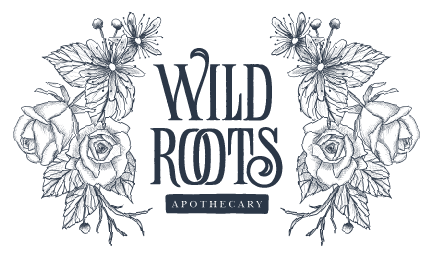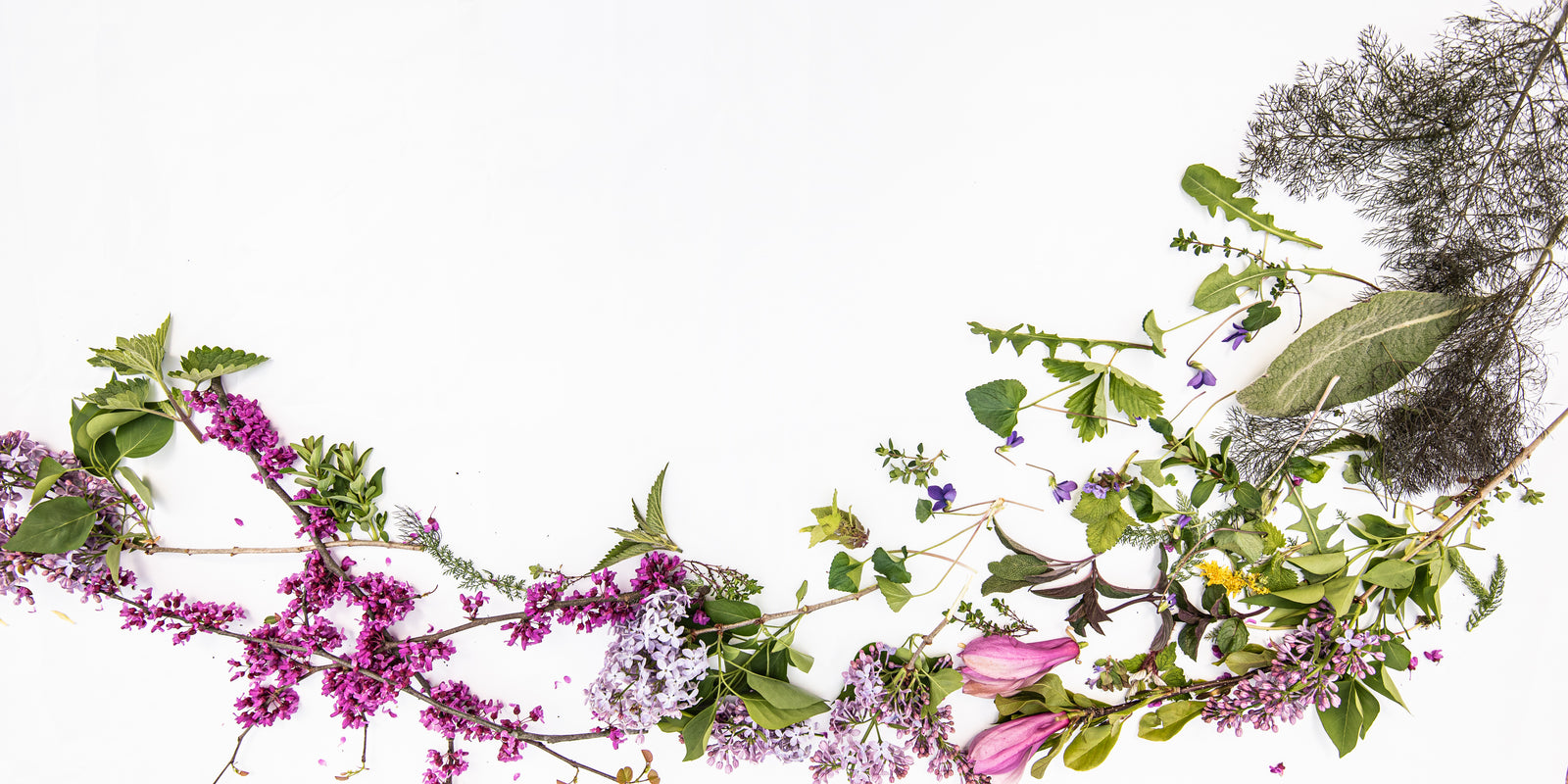I’ve been working in my garden lately andwhooeeshh...between the heat and the ripping out the big overgrown weeds, my back has been tight and inflamed. It made me think about one of my favorite root remedies for inflammation and strengthening of the musculoskeletal system: Solomon's Seal. I often reach for Solomon's Seal - both in a tincture and oil... this is hands down one of my favorite powerhouse herbs for arthritis, rheumatism, joint injuries, spine injuries and so much more.
When I first started learning about the medicinal uses of plants, I knew I had this in my yard: I loved the height and structure at the back of my garden and how it loved the shady wet corner. I didn’t realize that the beautiful “ornamental”Polygonatum biflorum (Solomon's Seal) was actually contained wealth of healing properties.
But now I do know after working with plant for over 5 years, I've seen how it can support and really pull the heat and strengthen the motion givers.
Solomon's Seal has a beautifully long stalk with alternating deep green leaves that produces little white umbel flowers in the spring that hang down where the hummingbirds come in to sip the nectar. The leaves I don’t really use but I do seek the root: a delicate tuber that is all weaved in and out of each other to harvest and make medicine with. This year, I was blessed with three pounds of this “miracle” root from a friend of a friend who ethically and sustainably maintains his patch in southwest Virginia. It was such a blessed day having those roots in the shop - all gnarly and sweet to munch on - and I had this feeling of euphoria wash over me, encouraging me to share this potent healer with as many folks as I possibly can. I encourage you to plant, harvest, use it in your day-to-day and then share away! There is so much empowerment in plant powered wellness I can’t help but share more.
I learned about Solomon's Seal as one of my first herbs through Teresa Boardwine of Green Comfort School of Herbal medicine. I knew this plant closely as a gardener, loving it as an early Spring backdrop all sweet and wonderful. It’s interwoven notched rhizomes twisted around each other creating knots and a puzzle work that speaks to how it can just get in there and soothe and heal.
This is hands down my favorite musculoskeletal herbs for supporting and strengthen the entire system by soothing inflamed tissues, moistening the respiratory tract, nourishing during menopause and for my creaky back, it promotes flexibility and I LOVE it for repetitive motion injuries such as tendonitis as an infused oil and tincture. We have Solomon's Seal in our aptly namedJoint Juice Body and Massage oil, along with other healing herbs.
Why that terrible name? For one, I couldn’t think of anything else yet and, two, it supports the ligaments and tendons and by tightening and loosening them as needed.
An Important Note about Safety:Solomon's Seal seem innocuous and so widely useful, but parts of it are poisonous. Except for the root and tender young shoots, all parts of the adult plant, especially the berries are poisonous and should not be consumed. The berries are stated to excite vomiting, and even the leaves, nausea, if chewed. (http://www.Solomonsseal.net/abouttheplant.html )
More from the Herbalist Eye:
Key Energetics: Moistening and Cooling
Family: Asparagaceae
Parts used: Root, harvested in early spring or fall.
Habitat: Grows in the Northeast and Midwest as a shade loving woodland plant that will spread rapidly when in good soil and has space to grow.
Taste: Sweet
Plant Spirit: I use it on an energetic level for strengthening and acting as a protectant herb especially when used with Vervain and Agrimony.
Herbal Actions and Details:
Mild Sedative: soothes nervousness, distress, irritation and inflammation associated with muscles and connective tissues, bursae, menstrual cramps
Vulnerary (wound healing): Solomon's Seal works on sprains and strains inflamed tendons, ligaments, muscles and joints.
Demulcent (mucilaginous herb meaning it’s slimy and coating): it is cooling, soothing and moistening for throat lungs and skin. Indications specific for dry coughs (as a tea).
Tonic Herb: toning the kidneys, heart and reproductive organs and is soothing on the digestive system, can be beneficial to the skin.
Anti-Rheumatic: eases pain, infection in the joints, inflammation. On connective tissues it works on stiffness, injury, overuse, underuse and lack of nourishment and detox to the connective tissue.
Plant Gifts: it helps to adapt internally to bones, connective tissues, joints etc by boosting up the immune system. It also directly “feeds” the irritated joints and cleanses by reducing inflammation.
Diuretic & Mild Laxative: increases the secretion and flow of urine by flushing the body of toxins and excess water, provides kidney support.
Anti-Inflammatory: One of the constitutions in Solomon's Seal is allantoin and may counteract the inflammatory response for injuries related to the muscular-skeletal systems.
Other herbalists have used Solomon's Seal for moistening of the lungs when irritated, as an expectorant and as a cardiovascular tonic. I can’t speak to these yet but I will definitely be adding this to the list of possibilities.
References:
Teresa Boardwine - Green Comfort Herbal School Foundation + Clinical programs
Jim Mcdonald for the use and especially harvesting techniques: https://www.herbcraft.org/solseal.html
I also referencedhttp://www.Solomonsseal.net/abouttheplant.html for a lot of great info above, there is a really cool zone chart on plantings, and the contra-indications below:
Photo by @pixabay-adege
DISCLAIMER
Colleen O’Bryant is a trained herbalist and not a licensed doctor or registered healthcare practitioner. She cannot and does not claim to diagnose health conditions, nor prescribe medicines. Colleen O’Bryant does not claim that the information and products she provides to Client will prevent, alleviate, or cure any diseases or medical conditions. The information and products Colleen and Wild Roots Apothecary provides is not intended to be a substitute for medical treatment. Please consult your medical care provider before using herbal products, particularly if you have a known medical condition, allergy or if you are pregnant or nursing. Always consult a medical doctor before modifying your diet, using any new product, drug, supplement, or doing any new exercises. Wild Roots Apothecary statements and products have not been evaluated by the FDA and they are not intended to diagnose, treat, cure, or prevent any disease or condition. Client understands that Colleen is not yet certified by the American Herbalists Guild, but by working with clients such as yourself she is gaining the required hours of practice to apply towards her certification.
Wild Roots Apothecary does not claim to be a pharmacy or prescribe medicines. Additionally, Wild Roots does not claim to be able to cure or relieve the client's specific condition or illness with the herbal formulations or recommendations provided.




